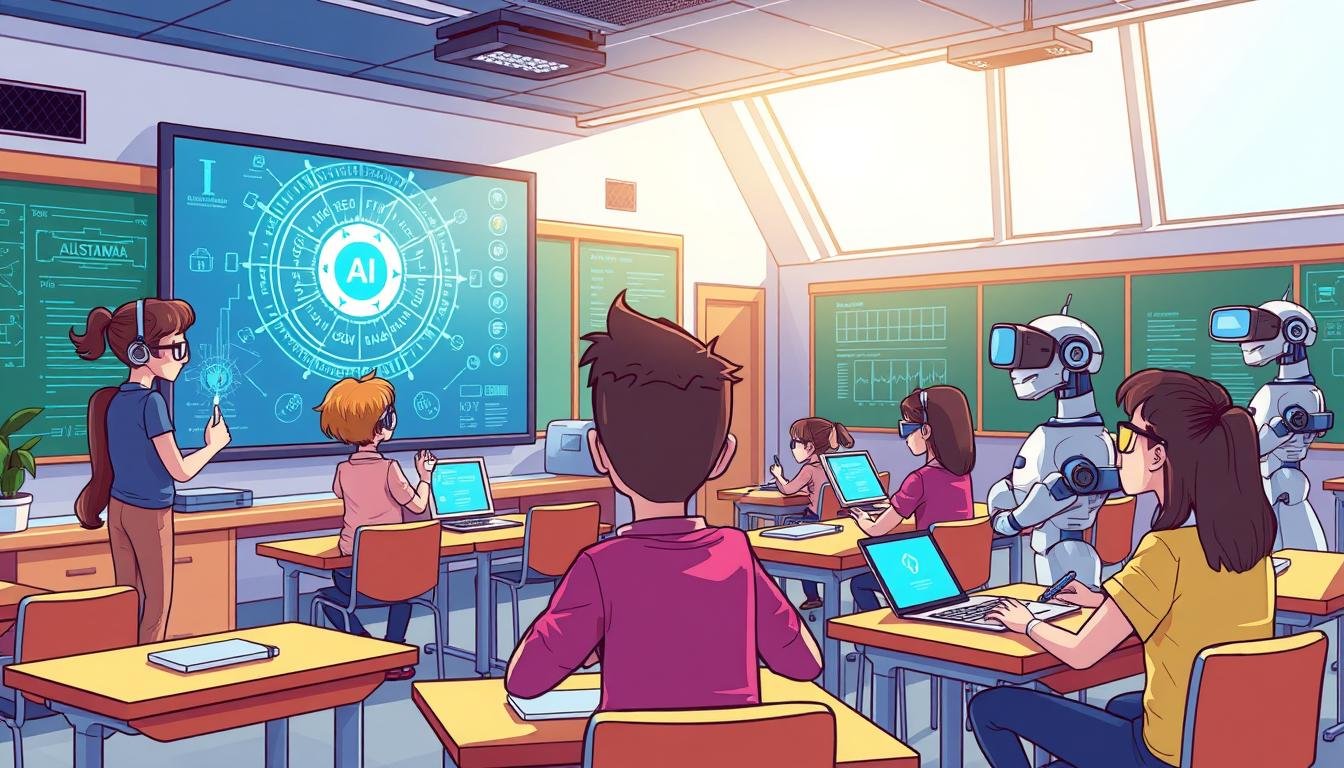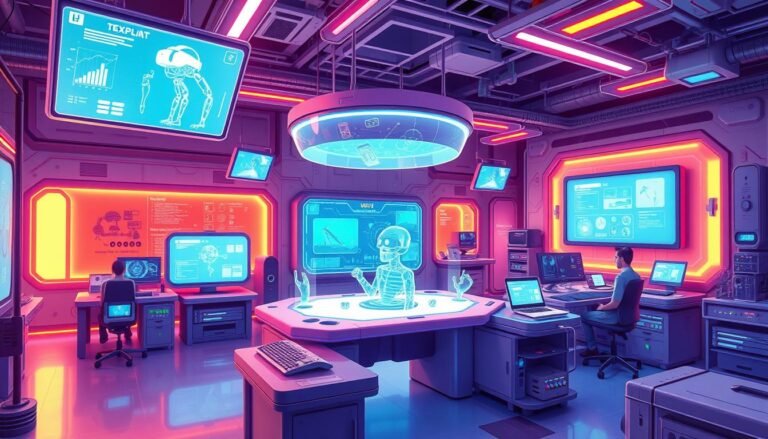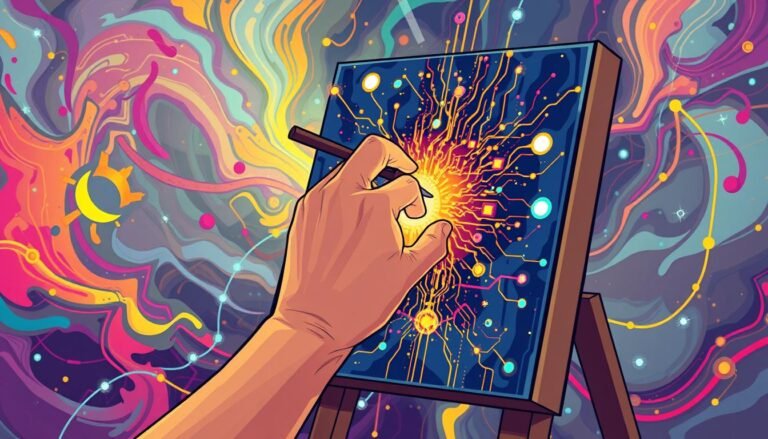The Impact of AI on Traditional Degree Programs
Is the bachelor’s degree on its way to becoming obsolete in the age of AI?
Artificial Intelligence (AI) is changing many fields, including education. LinkedIn CEO Ryan Roslansky said at the Talent Connect Summit that a bachelor’s degree might not be enough anymore. This is because the job market is changing fast, and we need to keep learning new skills.
Key Takeaways
- The market size for generative AI is forecasted to reach $1.3 trillion by 2032.
- AI tools help make educational content faster, so we can learn more quickly.
- AI-powered learning systems and virtual tutors give students personal help anytime.
- AI makes grading easier and can spot plagiarism, changing how we test what we learn.
- AI-driven platforms, like those at Faulkner University and Khan Academy, make learning more personal and fun.
How AI is Transforming Higher Education
AI is changing higher education by making learning personal. It uses adaptive learning systems to match content to each student’s needs. Schools like Schiller International University and Arizona State University are leading this change. They’re making learning more effective and enjoyable for students.
AI gives instant feedback, speeding up learning. It helps students get the help they need right away. Touro University and Western University are using AI to improve learning. They’re making education better for everyone.
AI does more than just personalize learning. It also makes learning materials available to everyone. AI tools like virtual assistants help students access quality resources. This breaks down barriers like money and location.
AI also brings challenges and opportunities to schools. It requires new teaching methods and skills for the job market. Schools are using AI for tasks like applying for grants. This shows AI’s wide impact on education.
| Institution | AI Initiatives | Impact |
|---|---|---|
| Schiller International University | Integration of AI in teaching methodologies | Personalized learning, instant feedback, student collaboration |
| Touro University | Appointment of AI Associate Provost and strategic AI plan | National leadership in AI education, operational improvements |
| Western University | Over 30 pilot AI projects | Enhanced student engagement, streamlined processes |
| Arizona State University | Collaboration with OpenAI | Enhanced student success, streamlined processes |
AI is getting better, and so is education. Its use in schools is changing learning for the better. It’s making education more efficient, engaging, and open to all.
The Shift in Curriculum Due to AI Integration
AI is changing education by teaching new skills for the job market. Students at Youngstown State University’s (YSU) online Master of Science in Education (MSEd) program learn about AI. This knowledge is key for today’s education.
AI is big in K-12 schools, helping with grading and finding students who need extra help. YSU’s program teaches how to use AI in teaching. This gives students an edge in the education world.
AI helps teachers make better learning materials by analyzing data. It finds gaps and updates content. This makes learning more personal for each student.
Using AI in teaching has its ups and downs. Teachers learn to use AI wisely for better student results. They teach coding to improve problem-solving and thinking skills.
Here’s how AI changes education compared to old ways:
| Traditional Curriculum | AI-Driven Curriculum |
|---|---|
| Standardized lesson plans | Personalized learning paths |
| Manual grading processes | Automated grading with detailed feedback |
| Fixed content updates | Dynamic content updates based on analytics |
| General instructional materials | Adaptive learning platforms |
| Traditional administrative tasks | AI-assisted management and scheduling |
Teachers must learn to use AI well to avoid problems like plagiarism. AI makes learning more personal and helps teachers with their work. This leads to better learning and less stress for teachers.
Challenges and Opportunities AI Brings to Universities
Universities are diving into Artificial Intelligence (AI) in their teaching. They face many challenges and opportunities.
Keeping up with AI’s fast pace is a big challenge. Schools must update their courses often. This requires a lot of investment in new technologies and faculty training.
Teachers need to learn about AI tools and methods. They need training programs that focus on AI. The EDUCAUSE QuickPoll Results show that educators have many tasks to do, like making policies and training resources.
There are also worries about potential biases and AI creating false content. Data privacy is a big issue too. Schools must protect personal data carefully.
But AI also offers great chances. 89% of educators see AI as a way to make learning more personal. AI tools like FeedbackFruits Automated Feedback can help students and teachers a lot. They can also make administrative tasks easier, so teachers can focus on teaching.
The Educause Horizon Report 2023 shows AI can save money and make tasks easier. It also shows that more educators believe AI will change classrooms for the better. 81% of educators think AI’s biggest chance is in personalized learning.
AI is also great for making data insights. This helps schools make better decisions and do more research. But, there’s a 67% concern about AI being used for cheating. Building trust between humans and machines is key.
As AI changes education, finding a balance is important. AI brings both challenges and chances. The future depends on careful planning, enough investment, and training for the academic community.
AI-Driven Learning Platforms and Tools
Platforms like Khan Academy and Duolingo have changed education. They offer learning that fits each person’s pace and style. This makes learning fun and effective for everyone.
SimSnap shows AI’s power in tough subjects. It uses interactive simulations to help students learn life sciences better. This shows AI can make learning more engaging and effective.
AI also makes education more efficient. It helps teachers by doing routine tasks. This lets teachers focus on teaching and helping students more.
A survey in Saudi Arabia showed people like AI in education. They see it as a way to improve teaching and learning. They dream of a future where learning is tailored to each person.
But, there are worries about privacy, security, and bias with AI. We need to handle these issues well. This way, AI can help everyone learn, no matter their background.
The following table summarizes the key contributions and concerns associated with AI-driven learning platforms:
| Key Contributions | Concerns |
|---|---|
| Personalized Learning Experiences | Privacy and Data Security |
| Real-Time Feedback and Insights | Ethical Considerations |
| Streamlined Administrative Tasks | Bias in AI Models |
| Enhanced Engagement | Over-reliance on AI |
| Support for Lifelong Learning | Disparity in Digital Access |
As shown by Case Studies: Khan Academy, Duolingo, and SimSnap, AI is changing education. It makes learning personal, provides feedback, and helps with school tasks. But, we must tackle the ethical issues to fully benefit from AI in learning.
The Impact of AI on Traditional Degree Programs
The rise of AI is changing traditional degree programs. It’s making us rethink what higher education is all about. Now, universities need to focus on teaching specific skills for jobs that use AI.
- Personalized learning paths
- Automated grading systems
- Virtual tutoring
- Enhanced admissions processes
- Early intervention strategies
- Streamlined administrative tasks
This educational evolution is crucial as more industries use AI.
Comparison Between Traditional AI and Generative AI:
| Traditional AI | Generative AI | |
|---|---|---|
| Function | Analyzing and interpreting existing data | Creating new content based on existing data |
| Transparency | More transparent decision-making | Often functions as “black boxes” |
| Resources | Requires moderate computational resources | Requires substantial computational resources |
| Scaling | Relatively easier to scale | Challenging to scale |
Leaders like OpenAI’s Sam Altman and IBM’s Christina Montgomery stress the need for teamwork. They say we must work together to handle AI’s impact on jobs. With 65% of job skills expected to change by 2030, teaching AI skills is key. Students need to learn new skills for jobs in healthcare and finance.
Rethinking the Value of a Degree in the AI Era
AI is changing how we work, making us question the worth of traditional degrees. Tuition has doubled in 25 years, raising doubts about the ROI of college. Many recent graduates are stuck in jobs that don’t need a four-year degree.
On the other hand, skilled trades like electricians and plumbers earn more than many college graduates. This shows that trade schools could be a better choice for some. They offer affordable education and quick job entry.
AI is leading to a shift towards shorter, focused learning. Sites like YouTube and Coursera provide quality training in various fields. This meets the needs of today’s industries better.
Education is now focusing on skills like communication and critical thinking. AI can speed up learning, but it might not teach these important skills.
The future of learning combines old methods with AI. This mix is key to teaching both specific skills and essential human qualities. It prepares students for long-term success.
| Traditional Degree | Alternative Pathways |
|---|---|
| High Tuition Costs | Low-cost Trade Schools |
| Long Duration | Short Micro-credentials |
| Generalized Knowledge | Specific Skill Training |
| Underemployment Risk | Higher Employment Rates in Trades |
Employers now value specific skills and certifications more than degrees. AI is changing education, from admissions to learning. It’s time to rethink what education means today.
Conclusion
Artificial intelligence is changing how we learn in college. Schools are now adding AI to their programs. This helps students learn better and prepares them for the future.
AI makes learning more personal and efficient. It can adjust study materials for each student and help with school tasks. But, there are also challenges like relying too much on technology and privacy concerns.
Colleges can use AI wisely by training teachers and balancing old and new methods. They must also think about ethics and protect student data. By doing this, they can make education better for everyone.
Source Links
- AI and College: The Impact on Online Learning – Faulkner University
- AI in Education: The End of Schools As We Know Them?
- The Impact of Artificial Intelligence on Higher Education
- Is AI Going To Transform Higher Education And How?
- How higher education can realize the potential of Generative AI
- How AI Impacts Curriculum Design
- The role of AI in modern education
- AI Impact on Education: Its Effect on Teaching and Student Success
- The opportunities and challenges of AI in higher education
- Considering the opportunities, dangers and applications of AI
- AI in Education
- Exploring the impact of artificial intelligence on higher education: The dynamics of ethical, social, and educational implications – Humanities and Social Sciences Communications
- Impact of Artificial Intelligence in Education
- Exploring the Impacts of AI on the Future of Education
- Traditional AI vs. Generative AI: What’s the Difference?
- How AI threatens to make traditional college degree ‘obsolete’: experts
- Impact of AI on College Majors and Employment
- Rethinking College Education In An AI Work Future
- Rethinking education in the age of AI: The importance of developing durable skills in the industry 4.0
- The University is on Fire and We Don’t Want to See: The Massive Impacts of AI on Higher Education
- The Benefits of AI in Education – CIS University
- What is the Impact of Artificial Intelligence on Students?








